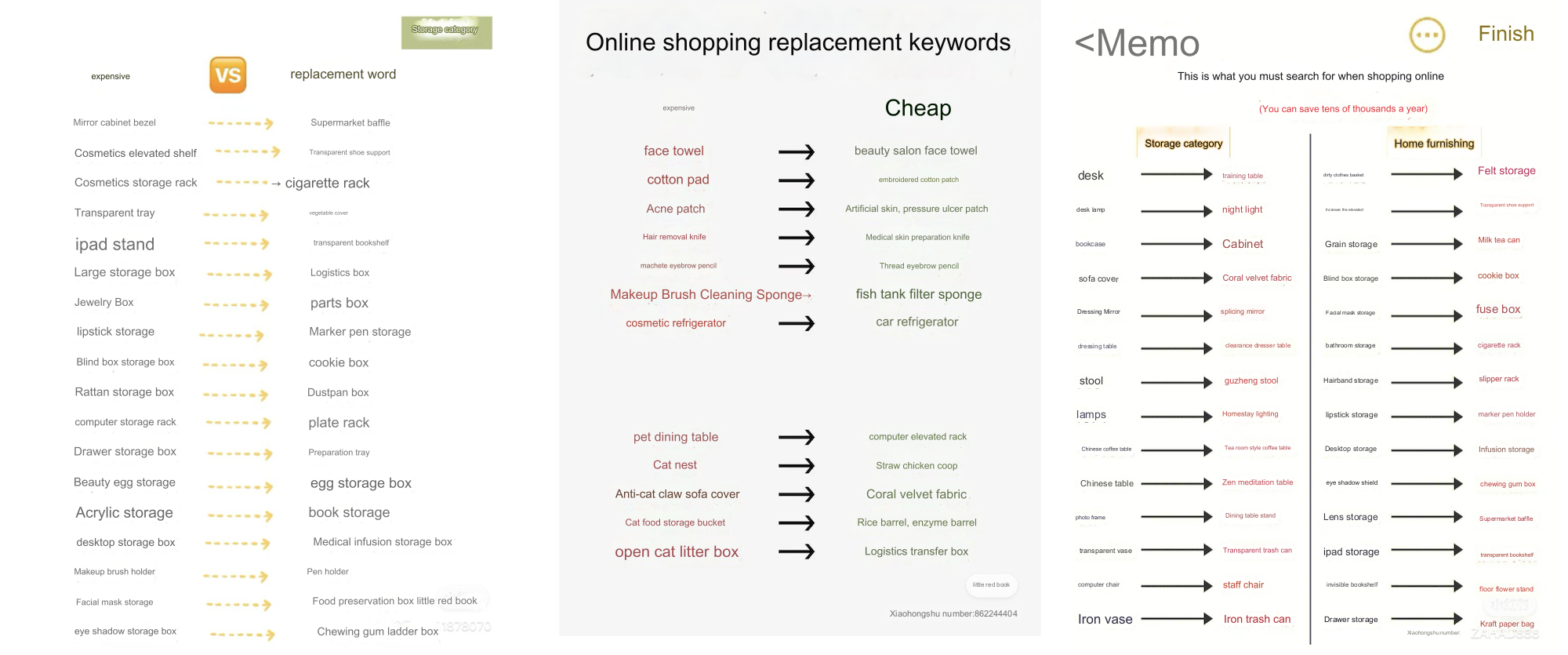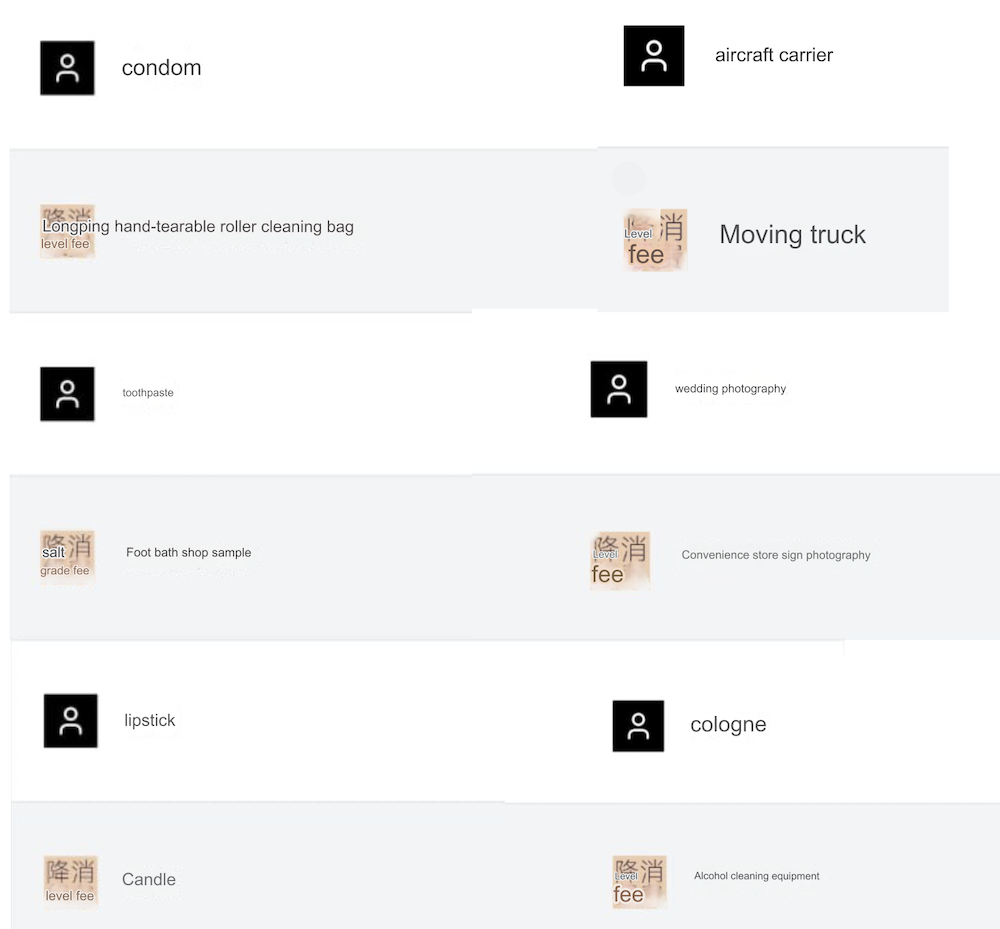Behind every search trick for a substitute product lies a form of folding in life.
It all started when I saw a post about how to use alternative search terms to buy products with the same functionality at a much lower price. For example:
Yoga Mat -> Men's Yoga Mat
Photo Wall -> Fishing Net
Picnic Cloth -> Waterproof Tablecloth
...
I tried a few of these tricks and found that some no longer worked, while others indeed offered significant savings. Consequently, I searched for “substitution keywords” on Xiaohongshu (小红书) and discovered many posts with over 10,000 likes. Typically, these posts include a series of images, each displaying a list of product name pairs, comparing expensive products with their cheaper alternatives, as shown below:

These comparison tables are useful but not user-friendly. When I actually want to search for a product, I need to sift through these dense tables. Moreover, when the product I’m looking for isn’t listed, they become useless. I wondered if AI could enhance this experience. Imagine training a model where users input the product they’re searching for, and the model suggests alternative keywords for a cheaper option.
I quickly organized some data and began training the model. OpenAI already supports finetuning models. Simply export and upload the data, and it will start training automatically. I chose the gpt-3.5-1106 model, and the training took about 10 minutes. Finally, I built a webpage for model invocation. Thanks to the comprehensive development tools, I was able to complete this demo product in just an afternoon.
Folding Consumption
The most enjoyable part of web development is always selecting a domain name. I quickly chose the URL: pingti.xyz, which is both cheap and memorable. I encouraged all my friends to try it, and most of them found it fun, although some results were quite outrageous (Toothpaste -> Foot bath shop sample, iPhone -> Used iPhone, Lipstick -> Candle). However, many were actually quite useful. At the very least, the model remembers the substitute terms from the screenshots, eliminating the need to search one by one.

There are still some less accurate results, which made me think about how to optimize the model. This necessitated a close analysis of the original training data to identify patterns. The main patterns are:
-
Gender Arbitrage: For example, Yoga Mat -> Men’s Yoga Mat, or Sun Umbrella -> Men’s Umbrella, reflecting the tendency of men to prioritize functionality and cost-effectiveness over aesthetics and design, which adds to the cost.
-
Scenario Arbitrage: For instance, Vest -> Old Man’s Vest as elderly people care more about price, Women’s Bag -> End-of-Batch Bag needs no explanation, Carpet -> Office Carpet, Desk -> Training Desk, Chair -> Wedding Chair - perhaps because cheaper materials are used in offices, training, and weddings?
-
Regional Arbitrage: For example, Socks -> Zhuji Socks, Earrings -> Yiwu Earrings, because a majority of China’s socks are produced in Zhuji, specifying the city can lead to lower prices.
-
Unclassifiable: This is the most intriguing part. The key point is that although both products are almost entirely dissimilar and have no common ground, the cheaper one can nearly substitute the more expensive one in terms of functionality. Examples include Photo Wall -> Fishing Net, Photo Frame -> Business License Frame, Face Mask Storage -> Food Preservation Box, iPad Stand -> Recipe Holder, Nail Lamp -> Money Checker Lamp, Lego Dust Cover -> Supermarket Display Box. Each of these substitution tricks reveals a ‘folding’ of life, which might lead you to ponder.
I realized that, even though a simple fine-tuned model might learn the first two arbitrage patterns and maybe the third with additional rules (assigning cities to respective industries), it could never learn the last type of substitution. These patterns are the ones that even humans need extensive practical experience to figure out.
Hao Jingfang’s Folding Beijing tells a story of different social classes living in the same city but never intersecting in space and time. I think the concept of ‘product substitution’ offers a glimpse into this folding phenomenon. I recall my first purchase of Vitamin C: I searched on Zhihu for the differences between the expensive brand of Vitamin C and the one available in hospitals. The conclusion was that the former is sweeter. Since then, I have always purchased Vitamin C from Northeast Pharmaceutical, priced at 1/100th of the former.
In an economic downturn, everyone is cutting costs. Imagine this: One day in the future, I sit on a wedding-specific chair, with a fishing net on the wall displaying my photos, and in front of me on a training desk sits a recipe holder holding an iPad playing a video. It’s a funny scene, but life goes on. Regardless of how products are substituted, life itself is irreplaceable: it’s not about the net, but the photos on it.